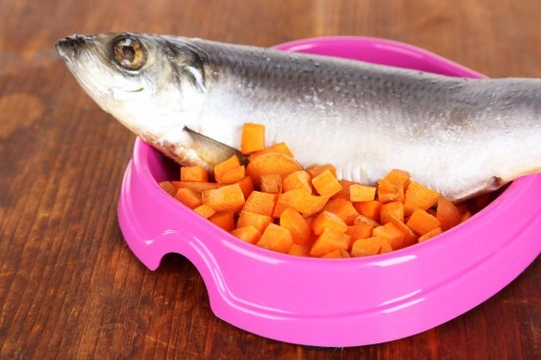
Can you feed fish to your dog, and is fish a good ingredient in dog food?
While most dog foods get their main ingredient and flavour from meat such as chicken, beef or lamb, it is also possible to buy a variety of other flavours in different ranges too, such as salmon, white fish, and various others. Dog owners are sometimes a little confused by this, as fish isn’t something that we really think of as being a natural food for dogs, albeit dogs in the wild that have access to easy to catch fish or the remains of fish that they scavenge will happily eat them.
Feeding your dog a complete dog food that has fish as one of the main ingredients should, as a general rule be fine, as the nutritionists at the pet food company will have done all the hard work for you! However, it is a good idea to get a good understanding of the role that fish can fulfil within the canine diet, plus take some advice on what types of fish you can safely give to your dog to supplement their diet. Read on to learn more.
The advantages of fish within the dog’s diet
Obviously there are a huge amount of different types of edible fish within the world, and many of these are recognised for their nutritional benefits and the various health advantages that they can bring. For instance, cod liver oil is a popular canine supplement, and can help to produce a shiny coat and healthy skin, while also supporting the muscles and joints.
Feeding the right kinds of fish, or picking a complete diet that contains fish can provide added value for a lot of dogs, as fish are rich in omega 3 and essential fatty acids, which can help to support joint function and ease stiffness. Fish and good quality fish oils are often included within dog foods, even ones that are ostensibly meat based, due to the range of benefits that they can add to the diet.
Complete dog foods that are fish based will usually contain de-boned, finely shredded and processed fish matter, as well as another source of protein such as chicken to offer a complete diet
Are there any risks involved in feeding a diet containing fish?
Fish and all other products that are included within complete dog foods in the UK should be human-grade, and not consist of scraps or other ambiguous products that simply pad out the meal without offering any advantage. The fish used within such diets should be top quality, and carefully sourced and tested before being used within dog food.
One well known issue that often makes dog owners question fish as an ingredient of dog food is the potential of salmon poisoning syndrome; this condition is caused by internal parasites that can be present within salmon and other types of fish that swim upstream to breed. While rare, it is an incredibly serious condition that may potentially prove fatal. However, the risk of salmon poisoning syndrome is only present within raw fish, and as canine diets contain only cooked fish, this issue is negated.
The other issue that may arise if feeding fish at home is that bones may be present, even if you are extremely careful about removing all bones, and these may potentially pose a risk to your dog’s health and can cause internal injury.
Offering a range of protein sources
Just as humans soon get bored of eating the same old food all the time, your dog too may well get fed up in short order of eating the same flavour every day. Providing a range of different types of proteins and rotating the protein source used within your dog’s food regularly can help to counteract this, and as each different protein source offers different benefits, it can help to support lifelong health too.
Changing your dog’s main source of protein on a regular basis too can help to expose your dog to a range of different flavours and ingredients, and reduce the likelihood of their developing allergies or food intolerances as they age.
Feeding supplementary fish
If you wish to feed your dog fish at home rather than as part of a prepared diet, this can be really beneficial for your dog, but there are various considerations to bear in mind before you throw Fido a kipper! Never feed raw fish to your dog, as these may contain parasites, and also, take care to remove bones before feeding.
Choose fish carefully and go for ones that are easy to de-bone, and are not likely to contain small, fine bones even after you have picked through them. Don’t give your dog smoked, flavoured or garnished fish, nor anything that is rich in salt or that has been cooked in a sauce or with potentially dangerous ingredients such as garlic or onions.



